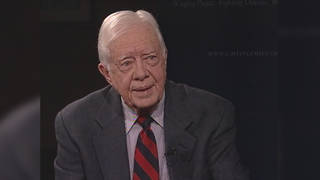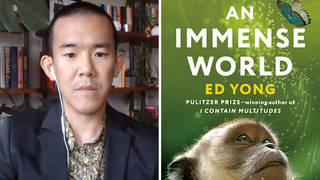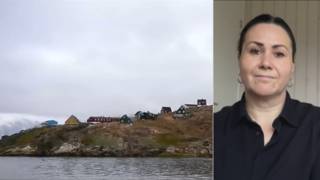
Related
Topics
Guests
- Will Potterinvestigative journalist and TED fellow who focuses on how the war on terrorism affects civil liberties. He runs the website GreenIsTheNewRed.com. His latest article is titled, “Sea World Employee Busted Infiltrating PETA.” Potter is also the author of Green is the New Red: An Insider’s Account of a Social Movement Under Siege.
- Hal Weissvolunteer with PETA who protested alongside an undercover SeaWorld infiltrator, Paul McComb, at the 2014 Rose Parade.
- Matthew Strugardirector of litigation for the PETA Foundation.
The People for the Ethical Treatment of Animals has accused the popular animal theme park SeaWorld of infiltrating its organization by sending an employee on an undercover mission posing as an animal rights activist. According to PETA, the SeaWorld employee took part in numerous PETA protests against SeaWorld, including one at the 2014 Rose Parade in Pasadena when he was arrested along with other activists. One photo posted on Twitter showed him inside a police van along with other arrested activists. PETA activists knew the man as Thomas Jones, but his real name was Paul McComb. Unlike the other activists arrested that day, he was released without charge. His name never appeared on an arrest sheet. According to PETA, McComb also repeatedly used social media in an effort to incite other activists, stating that it’s time to “grab pitchforks and torches” and time to “burn [SeaWorld] to the ground.” We speak to Matthew Strugar, director of litigation for the PETA Foundation; PETA volunteer Hal Weiss; and Will Potter, investigative reporter and author of “Green is the New Red: An Insider’s Account of a Social Movement Under Siege.”
Transcript
JUAN GONZÁLEZ: We end today’s show with news about SeaWorld, the popular animal theme park known for its dolphin and killer whale performances. On Tuesday, People for the Ethical Treatment of Animals revealed SeaWorld had infiltrated its organization by sending an employee named Paul McComb on an undercover mission posing as an animal rights activist. According to PETA, McComb took part in numerous PETA protests against SeaWorld, including one at the 2014 Rose Parade in Pasadena, when he was arrested along with other activists. One photo posted on Twitter showed him inside a police van along with other arrested activists. McComb told activists his name was Thomas Jones. Unlike the other activists arrested that day, he was released without charge. His name never appeared on an arrest sheet.
AMY GOODMAN: According to PETA, the undercover SeaWorld employee also repeatedly used social media in an effort to incite other activists, stating that it’s time to, quote, “grab pitchforks and torches” and time to “burn [SeaWorld] to the ground.”
To talk more about the case, we’re joined by three guests. [Matthew] Strugar is with us, director of litigation for the PETA Foundation. Hal Weiss is a volunteer with PETA who was arrested alongside the undercover SeaWorld employee at the 2014 Rose Parade. They’re both joining us from Los Angeles. In Washington, D.C., Will Potter is with us, investigative reporter and author of Green is the New Red: An Insider’s Account of a Social Movement Under Siege. We invited SeaWorld on the show, but they declined our request.
Will, first lay out this picture of what has been exposed.
WILL POTTER: What we found out recently is that in their desperation as their profits continue to plummet and as SeaWorld has really been rocked by the Blackfish movie and the cultural change that that’s prompted, they’ve resorted to some dirty tricks, including using staff members to attempt to infiltrate protest groups and PETA volunteers, going so far as to actually provoke and instigate, or attempt to on social media, illegal activity. Unfortunately, though, this isn’t really a shock if you’ve been following these types of activities by corporations for quite some time.
AMY GOODMAN: Matthew Strugar, you’re the director of litigation for PETA. Explain what you learned and when you learned it.
MATTHEW STRUGAR: Like Will said, this was a desperate attempt by a desperate company to save stock prices that are plummeting and attendance that is tanking. When this gentleman was arrested with 16 other activists at the 2014 Rose Parade, he was handcuffed, he was taken to the station with all the other activists, and after the other activists were booked and released, he never came out of the jail. And people were waiting, sitting around, still waiting for him to be released. And they called him, and he said, “Oh, I got out a long time ago.” We looked into it. He never showed up on any arrest sheets. He never received any charges.
And in connection with my representation of the other 16 activists, I called him, basically as—to interview him as a witness in connection with my clients’ arrests. He gave me just some really incredible stories, saying that he stayed at a local city nearby before the Rose Parade, but couldn’t name any city nearby, including the one that he stayed in; said that after he was arrested, he simply—he broke down crying in a holding cell, and the police had pity on him and released him, as if that’s something that ever happens. And then when I asked him, you know, where he worked and some basic pedigree information and told him I might have to call him as a witness in connection with the criminal trials, he got incredibly defensive, told me to lose his number, eventually hung up on me, said there was no way he was ever going to testify. So, that’s when we knew that something was up.
JUAN GONZÁLEZ: And, Hal Weiss, could you talk about the role he played in the protest and your interactions with him?
HAL WEISS: My interactions with him were rather limited. If you look at the photographs, I think he was arrested right next to me. I shared a bench with him in the paddy wagon. Other than that, I remember him essentially keeping to himself. He didn’t say much to me. I had never seen him before that day, and I don’t recall ever seeing him again after.
AMY GOODMAN: So talk about the protest, Hal, that you engaged in and your feeling now about this person, who you thought was a fellow activist, being an employee of SeaWorld, the organization you were protesting.
HAL WEISS: Well, we went out on that January 1st to protest SeaWorld’s participation in the Rose Parade.
AMY GOODMAN: Why?
HAL WEISS: And I recall Tom, Tom Jones—is this his name? Or Paul, Paul McComb? Whatever his actual name is—being there with us, kind of just popping up out of the blue. I was extremely focused on the day ahead of us. I wanted to show my concern about orcas in captivity at SeaWorld, so I didn’t pay much attention to him.
AMY GOODMAN: I want to turn to a clip from the documentary Blackfish. It’s a 2013 documentary which takes a critical look at SeaWorld, the film exposing how holding killer whales in captivity is dangerous for both them and their human trainers. This is a part of the trailer for Blackfish.
JOHN JETT: When you look into their eyes, you know somebody is home.
DAVE DUFFUS: They’re an animal that possesses great spiritual power, not to be meddled with.
ORANGE COUNTY SHERIFF’S OFFICE: Orange County Sheriff’s Office.
911 CALLER: We need SO to respond for a dead person at SeaWorld. A whale has eaten one of the trainers.
NADINE KATLEN: Tilikum, though, is the one that went after her.
REPORTER: Dawn is the senior trainer here at Shamu Stadium.
SAMANTHA BERG: She captured what it means to be a SeaWorld trainer. And it made me realize what happened to her really could have happened to anyone.
JOHN JETT: I’ve been expecting somebody to be killed by Tilikum.
JEFFREY VENTRE: We weren’t told much about it, other than it was trainer error.
DAVE DUFFUS: It didn’t just happen. It’s not a singular event. You have to go back to understand this.
HOWARD GARRETT: The speedboat herded them in, and they could just pick out the young ones.
JOHN CROWE: This was the worst thing that I’ve ever done.
JEFFREY VENTRE: When Tilikum arrived at SeaWorld, he was twice as large as the next animal.
UNIDENTIFIED: We stored these whales in what we call a module, which was 20 feet across and 30 feet deep, and the lights were all turned out.
KEN BALCOMB: Probably led to what I think is a psychosis.
AMY GOODMAN: The film Blackfish recounts the 2010 death of veteran SeaWorld trainer Dawn Brancheau by a killer whale named Tilikum. Now, we did reach out to SeaWorld. They declined to come on the show, but they did send us a statement to read on the air. They wrote: “We are focused on the safety of our team members, guests and animals and beyond that we do not comment on our security operations. This is a responsibility that we take very seriously, especially as animal rights groups have become increasingly extreme in their rhetoric and tactics. In fact, PETA itself actively recruits animal rights activists to gain employment at companies like SeaWorld, as this job posting demonstrates. Safety is our top priority, and we will not waiver from that commitment.” Again, that, the statement of SeaWorld. Matthew Strugar, the lawyer for PETA, if you would respond?
MATTHEW STRUGAR: It’s a bizarre response that they say that they’re concerned about the safety of their employees and the rhetoric of animal rights activists, when it was their own employee who had the most inflammatory rhetoric of any anti-SeaWorld activist that I’ve seen, who had this guy posting on social media that you need to bring the pitchfork and torches to the demos, that we need to burn this place down, even encouraging activists to show up at SeaWorld vice presidents’ houses with bullhorns late at night and keep them awake. And that’s just not the kind of rhetoric we often hear within the anti-SeaWorld movement. This guy was going to demonstrations saying, you know, “We knew to take increasingly militant action,” increasingly encouraging people to ramp up their activity. So, the bizarre thing is that the most inflammatory rhetoric and the most—you know, who seemed like the biggest threat to SeaWorld’s safety, of its park employees, was their own employee in this situation.
JUAN GONZÁLEZ: And, journalist Will Potter, I wanted to ask you, what’s been the impact of the campaign of PETA to expose the mistreatment of fish at SeaWorld? You’re seeing now on television almost BP-like ads, on television constantly, by SeaWorld, claiming that it’s treating its animals properly.
WILL POTTER: Well, when people make a lot of money by abusing animals, they don’t like having that abuse exposed, because it means they lose profits, and consumers don’t like that very much. And that’s exactly what’s happened with SeaWorld, and especially with Blackfish. I mean, it’s really unprecedented how quickly the tides have turned against this company. In just a couple of years, there’s been a groundswell of public opposition and just a cultural change in how we regard these animals and using animals for entertainment at places like SeaWorld. And I think these types of tactics, that I’ve reported on extensively, from corporations are truly an act of desperation, when activists become incredibly effective at changing cultural values, cultural discussion, and also threatening corporate profits. I think, if anything, the example of this infiltration and attempts at provocation show the lengths to which these companies are willing to go, rather than change their business practices and respond to consumer pressure.
AMY GOODMAN: You in fact have exposed other corporations infiltrating groups like PETA and others, Will.
WILL POTTER: Right, and we’re just really seeing the tip of the iceberg with this, I think. I mean, for a long time, I’ve written about tactics like this—disruption, infiltration, provocation—by the FBI, which we’ve seen for decades. But we don’t know as much about what corporations are doing. Some of the other examples I have reported on, though, are: Coca-Cola was exposed, through WikiLeaks, of contracting with a private security firm called Stratfor to spy on PETA activists and gather information about their protest activity; Burger King also hired spies to gather information about the Student/Farmworker Alliance, who were protesting their labor practices; and similarly, Greenpeace found out that companies like Dow Chemical were going through their dumpsters and hiring private firms to gather information in illegal ways to do that. So this is really—fits into that pattern of behavior. But what’s truly disturbing is we don’t know the extent to which this is happening. At least with the FBI, there’s some ostensible oversight or accountability. With these corporations, there’s nothing like that.
AMY GOODMAN: I want to thank you all for being with us, a fascinating discussion. We will continue this discussion. Journalist Will Potter, with us from Washington, and PETA volunteer Hal Weiss, as well as People for the Ethical Treatment of Animals’ litigation director Matthew Strugar, joining us from Los Angeles.













Media Options